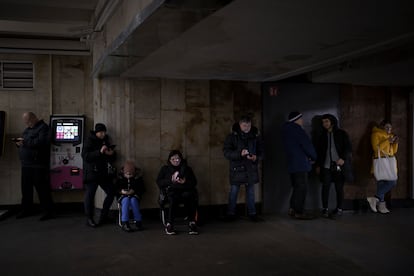Ukraine considers banning Telegram if app is confirmed as threat to national security
The Kyiv parliament has tabled a bill to pass an unpopular law proposal as over 70% of its citizens use the application as a source of information

Seventy-two percent of Ukrainians use Telegram as their main source of information. For 75%, it is also their first choice of communication tool, including hundreds of thousands of servicemen in the Armed Forces of Ukraine and the president himself, Volodymyr Zelenskiy. These statistics were provided in 2023 by the Media Detector consulting firm and used by the backers of a legal norm that wants to place limits on the use of the application. The Ukrainian parliament, the Rada, has since last week been studying week a bill that threatens to shut Telegram down. The measure, which has proven very unpopular but has garnered the support of deputies from four political groups in the Rada, is based on the hypothesis that the Russian Security Services (FSB) have access to information about its users, and also on the fact that citizens can consult the invader’s media and Russian propaganda accounts.
“Predictably, there is a public smear campaign against the authors of the bill,” deputy Mikola Kniazhytskyi of the European Solidarity party, the main opposition force, said on Espreso TV on March 27. The proposal has also been signed by several representatives of Zelenskiy’s People’s Servant party, which has an absolute majority in the Rada. Ukrainian citizens can consult Telegram without limits, as opposed to surfing the internet or following news outlets regulated by the Ukrainian media law. Any organization accused of spreading propaganda promoting the Russian invasion can be prosecuted in court. Websites registered in Russia are blocked in Ukraine, but not only that: as EL PAÍS has been able to verify, at least one Amnesty International report from 2022, which was harshly criticized by the Ukrainian authorities, cannot be viewed online from inside Ukraine.
The proposed law, dubbed in the media as “the law to block Telegram,” demands changes on the part of the companies that own these communication applications. Kniazhytskyi calls for Telegram to act in the same way as Facebook or YouTube: if there is content that is reported as violent, or users who are denounced for distributing false information, it must be removed. The Security Services of Ukraine (SSU) have already asked Telegram to take action against 26 users with hundreds of thousands of followers who justify the Russian invasion.
If these apps serve as an information channel, under the proposed bill they should be subject to the law on media regulation and the criminal code; these companies, according to the draft regulation, should have a fixed representation in Ukraine and should declare who their shareholders are and where they are domiciled. If a shareholder is a Russian resident, the app would not be able to operate in Ukraine. This measure is mainly aimed at Telegram: its founder, Pavel Durov, is Russian, although a citizen of the United Arab Emirates and resident in Dubai.
Yaroslav Yurchishin, chairman of the Rada’s committee on freedom of speech and promoter of the law, is convinced that Durov remains a Russian citizen and that he has some agreement with the Kremlin. “Probably, there is some control over Telegram on the Russian side. There is no guarantee that user information does not go to the Russian secret services,” Yurchishin said Monday on RBC media. The law does not facilitate a decision as forceful and complex as completely shutting down access to Telegram, Yurchishin said, but it is on the table if it were to be confirmed as a threat to national security.
The head of the Ukrainian Defense Ministry’s GUR intelligence services, Kyrylo Budanov, stated in a March 27 speech that Telegram does pose a threat to Ukraine: “Telegram is undoubtedly a problem for national security. I am totally against the suppression of freedom of speech, but this is too much. In our country, anyone can create a channel and write whatever they want, but if measures are taken against them, they shield themselves under the freedom of media information. But this is not freedom of media information.” Budanov admitted that Telegram also had a positive side: that with it, his fellow citizens in the Russian-occupied territories can also freely gain access to information.
Oleksii Danilov, until last week secretary of Ukraine’s National Security Council, the body that is monitoring Telegram, said last November that Russia may have access to 99% of the accounts on the network. Despite Durov, Telegram’s founder, living outside Russia, the Ukrainian authorities question his true independence from the Kremlin due to Vladimir Putin’s pressure to control his content.
Yurchishin stated on RBC that the possible closure of TikTok in the United States — for being a Chinese company that could violate national security — is a model to follow. The deputy also confirmed that Ukraine closely followed the order, subsequently suspended due to the complexity of the operation, issued on March 22 by Spanish judge Santiago Pedraz to block Telegram in Spain on a precautionary basis due to a complaint about copyright infringement by several TV stations.
Banning Telegram in Ukraine would mean a drastic change in the country’s communication model. Not only because it is the most-used channel among citizens, but also because all public administrations, political and military, report their decisions and relevant issues on their Telegram channels, from Zelenskiy’s daily messages to the Air Force warnings of the arrival of Russian missiles. Deputies in favor of limiting Telegram have reiterated that public bodies could be forced to stop operating with the app.
For war analysts, both from Ukrainian and Western institutes, Telegram is also essential because it contains the main information accounts not supervised by the Kremlin on the military situation on the Russian side. For citizens, it is also a way to access audiovisual entertainment content in Russian that cannot be accessed on the internet in Ukraine. An example of this was the success of the Russian TV series Slovo Patsana, which was the most-watched in Ukraine in 2023 despite being banned, and which thousands of people downloaded on Telegram channels.
Sign up for our weekly newsletter to get more English-language news coverage from EL PAÍS USA Edition
Tu suscripción se está usando en otro dispositivo
¿Quieres añadir otro usuario a tu suscripción?
Si continúas leyendo en este dispositivo, no se podrá leer en el otro.
FlechaTu suscripción se está usando en otro dispositivo y solo puedes acceder a EL PAÍS desde un dispositivo a la vez.
Si quieres compartir tu cuenta, cambia tu suscripción a la modalidad Premium, así podrás añadir otro usuario. Cada uno accederá con su propia cuenta de email, lo que os permitirá personalizar vuestra experiencia en EL PAÍS.
¿Tienes una suscripción de empresa? Accede aquí para contratar más cuentas.
En el caso de no saber quién está usando tu cuenta, te recomendamos cambiar tu contraseña aquí.
Si decides continuar compartiendo tu cuenta, este mensaje se mostrará en tu dispositivo y en el de la otra persona que está usando tu cuenta de forma indefinida, afectando a tu experiencia de lectura. Puedes consultar aquí los términos y condiciones de la suscripción digital.









































